- Home
- Anders de la Motte
MemoRandom Page 4
MemoRandom Read online
Page 4
“What’s that?” Tindra asked, pointing at a large scar on Atif’s right shoulder. A patch of scar tissue the size of a hand, wrinkled and slightly discolored.
“An old tattoo,” Atif said.
“Like the one Daddy’s got?” Tindra tilted her little blond head to one side and looked at him.
“Something like that,” he replied. “Is your mom up yet?”
Tindra shook her head.
“Not yet.”
“But you’re already up, all on your own?”
She shook her head again and looked serious for a moment.
“We’re both awake, Amu.” She laughed. She used the Arabic word for uncle, and Atif realized he liked it. He pushed the covers back and sat up.
“So you know who I am?” he said.
This time she nodded.
“Of course I know. Daddy’s got a picture of you in his phone. And me . . . but lots more of me,” she added.
“Of course he has,” Atif said. “A pretty girl like you.”
Tindra looked different in real life, far more animated than in the digital prints with which he had lined his mother’s little room at the nursing home. The girl was wearing a washed-out nightdress with a picture of some cartoon character he didn’t recognize. It looked as if she’d tied her hair up in two untidy ponytails herself. You’ve got your mom’s skin, Atif thought. But your dad’s eyes.
“Amu, can you make pancakes? Daddy always makes pancakes when he’s home. With jam and sugar.”
Atif got up from the sofa and stroked her cheek. He liked the way she frowned slightly when she asked for something. Adnan had done the same thing when he was little.
“Of course I can, sweetheart. I taught your dad everything he knows.” Atif regretted the words as soon as they were out of his mouth.
• • •
Tindra had already eaten three whole pancakes by the time Cassandra appeared at the door of the kitchen.
“Good morning,” Atif said.
“Mmm . . .” She bent over and kissed Tindra on the head. Atif glanced at her. He had known Cassandra before she and Adnan started dating. Back then her name had been Malin, someone’s plain little sister, slaving away in the city’s bars to earn enough money for a pair of silicone breasts and a few other physical enhancements.
Then she had changed her name, appeared in a couple of episodes of some forgotten reality show, and picked up some work as a glamour model. Car shows, VIP events, nightclub appearances, and a bit of associated activity. In those days she had been very attractive, if you liked nightclub blondes. Adnan evidently did. He had been a bouncer at a few fashionable clubs, where he helped fend off drunk jerks who got too handsy. He was good-looking, and every so often had plenty of money. And he was funny. He could entertain a whole room when he was in the mood.
Having a girlfriend whom other men would drool over suited Adnan, and when Tindra was born his world must have looked pretty much perfect. But that was several years ago now, and Cassandra’s glitzy glamour had started to fade. Wrinkles at the corners of her mouth from smoking, sallow skin, tired eyes. One of the rectangular false nails on her left hand was missing and the dark roots were clearly visible in her blond hair.
“Sorry we can’t offer you anything better than the sofa.”
Cassandra came and stood beside him at the stove as she fiddled with a pack of cigarettes.
“No problem. Like I said, I could always check into a hotel instead,” Atif replied.
She shook her head, lit a Marlboro, and blew the smoke toward the stove hood.
“Tindra really wanted to meet her uncle.”
“How’s she taking it?” Atif said, nodding toward the table, where the little girl was setting about her fourth pancake.
“She’s only six.” Cassandra shrugged. “How much do you remember from when you were six?”
More than I’d like to, Atif thought to himself.
“By the way, I’ve got a job this evening. Don’t suppose you’d be able to babysit for a few hours?”
“Of course,” Atif replied. “No problem at all,” he added. “Are you managing okay?”
“Money, you mean? Well, what do you think?” Cassandra shrugged again. “Did Adnan ever tell you about the gym he wanted to open up, over in Gläntan? Or the fact that he was plowing all our savings into it?”
Atif slowly shook his head.
“It’s been a long time since I spoke to Adnan.”
“Well, as usual, he managed to make a mess of it,” Cassandra said. “He got impatient that the building work was going so slowly, and borrowed money to speed things up. The gym turned out brilliantly in the end, but by then Adnan had already been bought out. You know what he was like, charming as hell, sociable, but patience was never one of his strong points.” She pulled a face that looked almost like a smile.
“Adnan was full of great ideas that never quite happened,” she went on. “Always on his way toward something, without ever really getting anywhere, if you know what I mean?” Her voice was hard, or at least harder than it needed to be. “But I’ve got my own income, and we’ve got friends who can help us, so we’re okay.”
“I see. Are there many people coming tomorrow?”
“Of course, that’s what I was going to tell you.” Cassandra dropped her cigarette in a half-full cup of coffee on the draining board, in which other yellow butts were already floating. “We had to push the funeral back a couple of days. To begin with the cops didn’t want to release the body. Then the undertaker had other bookings and it clashed with my work. I did try calling you, I spoke to that guy Faisal again, your boss. But you’d already left.
“You’re welcome to stay,” she went on. “But it’s okay if you need to get back. Like I said, we’re managing.” She pulled out another cigarette and offered him the pack. Atif shook his head.
“You’ve given up?” she said.
Atif didn’t answer. He was thinking of his return ticket, the job he’d been forced to leave unfinished, his neat little house, and the starry sky above his small garden.
Tindra was humming a song as she struggled to finish the last of the pancake. Atif looked at Cassandra again, thinking that he didn’t like her tone of voice when she talked about Adnan. The way she said the body. He wondered what sort of friends were helping her.
“It’s okay,” he said. “I can always change my ticket.”
• • •
Atif was on his way back to the building when he saw it. A big, dark-colored Audi, parked a bit farther up the street, but it set his alarm bells ringing straightaway. He hadn’t been out long, ten minutes max. He’d locked the front door securely and hadn’t even bothered to put his jacket on.
He had tucked Tindra up in bed about an hour ago, kissing her forehead gently before switching on the old CD player and pressing Play all of her favorite story, just as he had been instructed to do. Then he had settled down in the living room and zapped through a number of television channels, full of commercials, before realizing that the bag of paperbacks was still in the rental car over in the parking garage. He didn’t think it would take more than five minutes to fetch it. Tindra was fast asleep, and Cassandra wouldn’t be home before midnight.
The cold was biting into him, making him hurry even more. But when he saw the dark Audi parked there he slowed down and almost stopped. The car hadn’t been around when he came out, he was quite sure of that. There was no way he would have missed it.
It could be a surveillance car, but both the model and the shiny, outsized wheel trims made him doubt that. This car was too expensive and too ostentatious to be a cop car. But it was still parked in a perfect position for someone to keep watch over the entrance to their building. The engine was switched off but there was someone sitting inside, probably more than one person, to judge by the steamed-up windows.
He really ought to ignore it. Jog back across the street, just as he had planned, lock the door behind him, and settle down with his books. There must be fif
ty apartments in the block, so it was hardly likely that whoever was in the car was interested in him. Even so, he still couldn’t help going closer.
He stuck to the far edge of the sidewalk, setting one foot down in the snow on the grass to stay out of the cones of lights beneath the streetlamps as best he could.
When he was ten meters away he heard a noise. An electric whirring sound followed by a little click, as one of the windows was opened slightly. He didn’t stop, just looked down at the sidewalk and carried on. He could make out movement inside the car now. The outline of someone sitting in the driver’s seat, then someone else who seemed to be moving between the front seats. Fifteen feet, ten, five . . .
He passed the car and glanced cautiously inside it. He heard someone groan through the gap in the window and realized all of a sudden that this was something quite different from what he had thought at first. He carried on toward the door, almost grinning to himself.
But then he realized that the woman in the car seemed familiar. The jacket, tight leather pants, the long, platinum-blond hair that could do with having its dark roots bleached.
Suddenly he wished he hadn’t been so damn curious.
THREE
Sarac could see the white-coated woman’s mouth moving. He could make out the occasional word and realized that he was nodding in agreement, as if they had been talking for a while. His head felt strange, as if it had been filled with sludge. Heavy heartbeats in his chest. Fear. Who was this woman? Where the hell was he? This last question was easily answered. Gray plastic floor, textured yellow wallpaper, speckled plaster tiles on the ceiling. The distinctive smell of hospital, impossible to disguise, no matter how hard anyone tried.
“We’ve met several times now, David. Do you remember?” the woman in the coat said.
Sarac’s head went on moving up and down. He stared at the woman, trying to focus. High forehead, long, graying hair, dark-framed glasses, a tiny scar on her upper lip. Probably about fifty years old. Her appearance looked familiar, but he couldn’t locate a memory to match it against. His thoughts were still sluggish, as if he had been fast asleep and had just opened his eyes.
“Do you remember my name, David?” the woman asked.
“N-no, sorry,” he said.
The words sounded clumsy, as if he were sounding out each letter instead of joining them together.
“My name is Jill. Jill Vestman, and I’m a senior consultant in the neurology department here. Do you remember why you’re here?”
“Er . . . no.”
His body was still out of reach, but he managed to perform a brief check. His rib cage ached; his left arm was hanging limply in a sling. His chest and stomach felt tight, as if they had been strapped or sewn up. And then there was the headache. A rumbling, pulsing headache, the like of which he had never experienced before. It was making his thoughts fuzzy.
Dr. Vestman pulled a stool over and sat down beside the bed. She took a small notebook out of one of her top pockets.
“You suffered a minor stroke almost two weeks ago now, David. A hemorrhage in the left side of your brain. You were driving at the time and lost consciousness. You had a crash, in the Söderleden Tunnel.”
Sarac tried to straighten up but his body refused to obey him. What the hell was she saying? A stroke? No, no. Strokes happened to old men. Christ, he was only . . . only? His headache got worse, muddying his already hazy thoughts. The doctor seemed to note his reaction.
“The impact was severe,” she said. “You’d probably have been killed if you hadn’t been wearing a bulletproof vest and weren’t already unconscious.”
“Drunk driving,” Sarac said out of nowhere, without really knowing why.
“What do you mean, David?”
He had to stop for a few seconds to think. He tried to trace the train of thought back from his mouth and up into his foggy brain.
“Drunk drivers almost always survive,” he said slowly, tasting each word. His voice still sounded odd. As if it weren’t really his. Dr. Vestman nodded.
“That’s right, relaxed muscles don’t get damaged the same way tense ones do. It’s interesting that you remember that.” She made a note in her book.
“H-how?” Sarac muttered. “I mean, when . . . ?”
Things ought to be getting clearer now, but instead everything seemed to be going the wrong way. He was feeling sick, and his headache was getting worse too. And he was starting to feel frightened.
A stroke—a brain hemorrhage.
“Like I said, it was almost two weeks ago,” Dr. Vestman said, but stopped when Sarac tried to say something. Then she went on when he didn’t actually speak.
“When you came in you were in a very bad way, David. We kept you sedated for over a week to stabilize your condition. To start with we concentrated on the most acute problems, releasing the blood and easing the pressure inside your head. Then we dealt with your other injuries. You’ve broken your left collarbone and ruptured your spleen. Several of your ribs are cracked and you’ve got severe bruising. But, considering how bad the impact was, you’ve actually been extremely fortunate.”
She paused and looked down at her notebook, as if to give Sarac a few seconds to digest the information.
“On Monday we performed another operation on your head,” she went on. “We removed the remaining blood clots. You and I had our first conversation the day before yesterday.” She smiled at him, a gentle, sympathetic smile that she probably learned when she was training and had been refining ever since.
What the hell was she talking about? Awake, for three fucking days! He shook his head, harder this time, as if to shake that irritating smile out of it. His anger came out of nowhere.
“No way,” he snarled, and tried to sit up again. A fierce, burning pain made him put his hand to his head instinctively. His pulse was pounding in his temples. His right hand slid about, unwilling to do what he wanted it to. A double layer of gauze bandage, tightly wrapped around his skull. His hair! They’d shaved off all his hair. He must look terrible.
“The swelling in your brain is slowly subsiding, David,” the doctor said. “But it’s likely to affect your short-term memory for a while. That’s why you don’t remember the last few days. It’s not unusual, and in all likelihood it will improve.” Dr. Vestman fell silent and opened her notebook again, as if to let him take in what she’d just said.
He had questions, so many questions. An infinite number of questions. Like, for instance . . . Fuck, fuck, fuck! He had to try to calm down and get a grip on his brain before his headache succeeded in crushing it against his skull.
“I was thinking of asking a few questions, mostly to see where we are in the healing process. Don’t worry if you can’t answer some of them at the moment,” the doctor went on.
Sarac still couldn’t manage to say anything. He nodded instead, as he tried to slow his pulse down. It seemed to be working, at least partially.
“Do you know what month it is, David?
“How about what time of year?” the doctor added when he didn’t answer.
He was trying but couldn’t find the words. Instead he tried to conjure up images in his head. A calendar, the date on a newspaper, the screen on his cell phone. Snow, he suddenly remembered. Heavy, wet flakes covering the tarmac, settling like a blanket on the car windshield. Headlights reflecting off the snow. Blinding him, sticking into his head like knives.
“W-winter,” he said.
“Well done, David, that’s right.”
Sarac leaned his head back on the pillow. He felt suddenly relieved. At least he wasn’t completely gone. If he could just calm down a bit, if only this bastard headache could let up a bit, everything would become clear.
“Do you know what year it is, David?”
“Of course,” he said. “Two thousand eleven.”
Doctor Vestman said nothing, just made a small note. But something in her body language had changed.
“No, no, sorry! Two thousand twelve. Obviously,
I meant 2012,” he quickly corrected himself.
She looked up. Smiled again, the same irritating, sympathetic smile as before.
“It’s December 2013, David.”
“W-what?”
“It’s Thursday, December twelfth, 2013.”
“Impossible. I mean . . .” Sarac struggled once more to sit up, trying to push back against the mattress with his feeble right hand and almost losing his balance. He slumped back against the pillow instead. His headache shifted up a gear, then another. He screwed his eyes shut a few times. Then he slowly opened them. The fluorescent lights in the ceiling were flaring.
“Can you tell me about your last memory, from the time before the crash, David?”
“Of course,” he muttered. “No problem,” he added after thinking for a couple of seconds. But it wasn’t true. It didn’t even come close.
The time before the crash . . . His heart was suddenly galloping in his chest.
A stroke.
Car crash.
The time before . . .
December 2013.
The time before the crash . . .
December.
20 . . .13!!
Fucking hell!!!
“It doesn’t matter, David,” Dr. Vestman said, putting a hand on his shoulder. “Let’s rewind a bit,” she went on. “That often helps. Try telling me what your name is.”
“David Georg Sarac,” he said quickly. The words helped ease his panic slightly.
“And how old are you, David?”
“Thirty-five!” He breathed a short sigh of relief. It worked when he didn’t try to think. If he just let the answers come out automatically.
“Where do you live?”
“Birkastan. Rörstrandsgatan, number 26. Third floor.”
“Family?”
“Mom and Dad are dead. My twin sister, Elisabeth, lives in Canada.” He paused.
“Ontario,” he added, and suddenly felt much calmer. He wasn’t some fucking vegetable, as he’d begun to suspect. His brain was sluggish, sure, but he wasn’t completely gone. All this would soon be over, and everything would fall back into place.

 Rites of Spring
Rites of Spring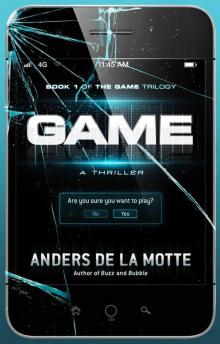 Game: A Thriller
Game: A Thriller End of Summer
End of Summer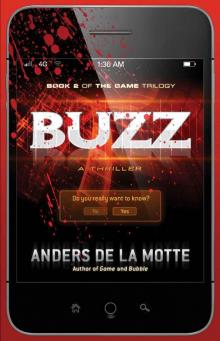 Buzz: A Thriller
Buzz: A Thriller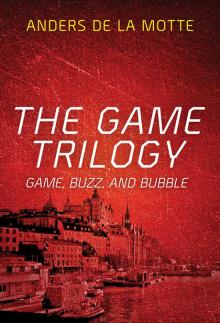 The Game Trilogy
The Game Trilogy Bubble: A Thriller
Bubble: A Thriller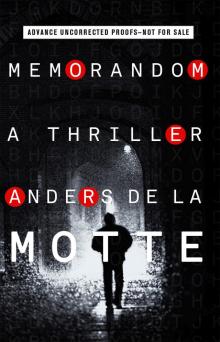 MemoRandom
MemoRandom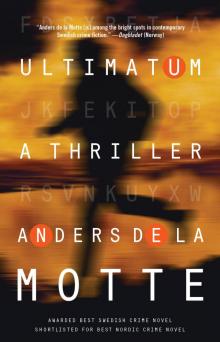 Ultimatum
Ultimatum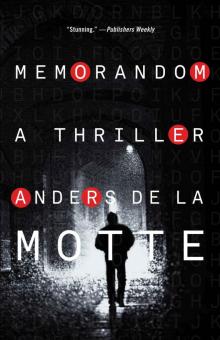 MemoRandom: A Thriller
MemoRandom: A Thriller